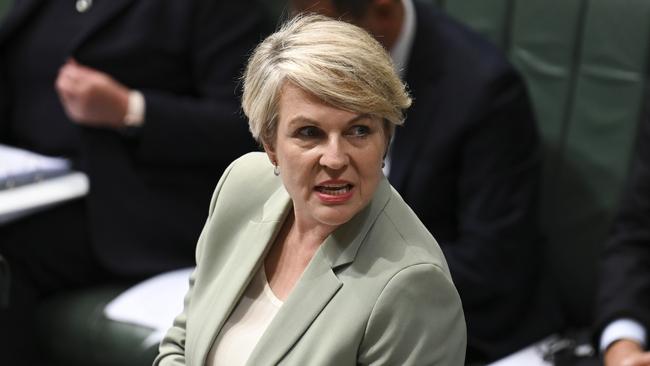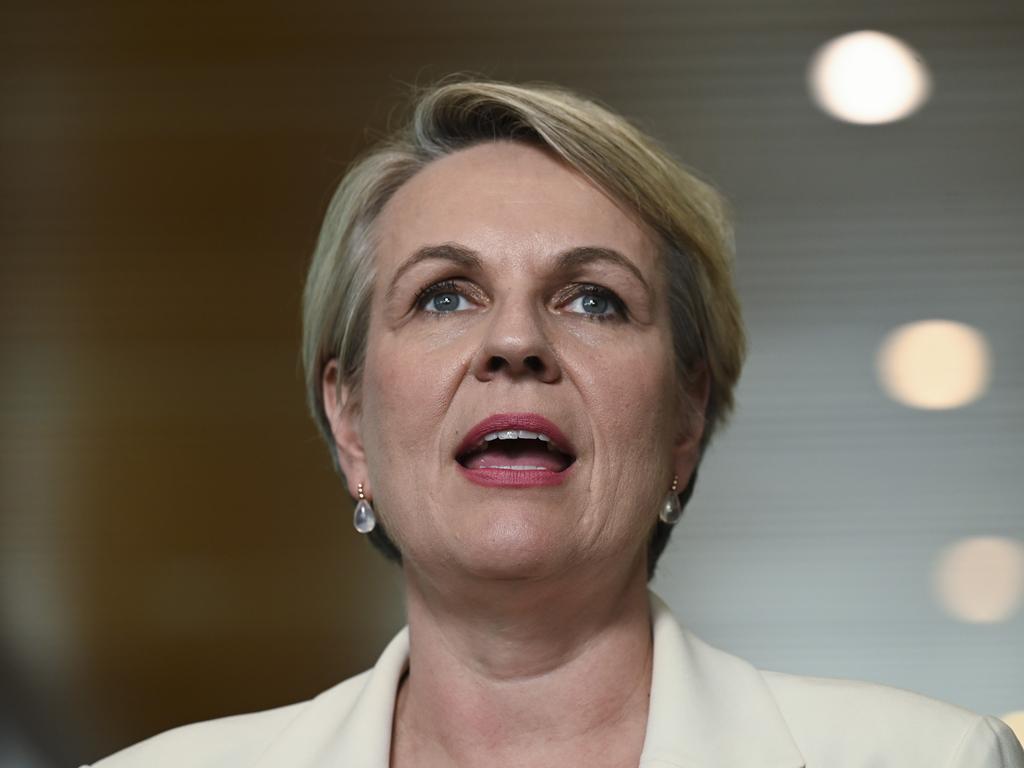Victorian wind farm project veto stuns both sides of the power transition
Jacinta Allan has indicated her government believes offshore wind projects should take precedence over wetlands of international significance.

Energy industry leaders from both the renewable and fossil fuel sectors have warned federal Labor’s “astounding” decision to veto a key plank of Victoria’s offshore wind strategy leaves the state with little choice but to extend its reliance on coal or finally embrace gas.
But Victorian Premier Jacinta Allan has indicated her government believes offshore wind should take precedence over wetlands of international significance, saying she was “not particularly happy” with the decision and was considering options.
The Australian revealed on Monday federal Environment Minister Tanya Plibersek has ruled the Allan government’s plans for an $800m-$1.4bn terminal to build offshore wind turbines at the Port of Hastings poses a “clearly unacceptable” risk to local wetlands.
At a minimum, the decision will significantly delay Victoria’s plans to produce at least 2GW of electricity via offshore wind by 2032, 4GW by 2035 and 9GW by 2040 – all of which underpins the state’s renewable energy target of 95 per cent by 2035, and the Albanese government’s target of 82 per cent by 2030.
Since 2014, federal environment ministers have issued just five “clearly unacceptable” notifications out of a total of 5000, making Ms Plibersek’s decision to reject the state Labor government’s proposal exceptionally rare.
The other four projects include a distribution centre in the NSW town of Wyong, a retirement village in Queensland, a renewable energy hub in Western Australia and a wind farm in Queensland, the latter three having been rejected by the former Coalition government.
One wind industry source said such a decision could “only” be made “in Australia”.
“You have a state Labor government that is committed to offshore wind and a federal Energy Minister that is also all-in on offshore wind, and then the federal Labor Minister for the Environment makes this decision. It is astounding,” the source said. “I’m sure the Victorian government will push for a revised environmental management plan but the industry does not have time to waste and the whole thing could have been avoided.”

As one of Australia’s most coal-dependent states, Victoria is heavily invested in the development of offshore wind, with its two largest sources of electricity – EnergyAustralia’s Yallourn coal power station and AGL Energy’s Loy Yang – set to close in 2028 and 2032 respectively.
The state has also controversially championed a move away from gas, banning gas connections to new homes requiring a building permit from January 1, and issuing the latest update to its gas substitution road map just last month.
Australian Pipelines and Gas Association CEO Steve Davies said the Allan government must finally embrace the role of gas in the energy transition, with “indefinite delays” to the offshore wind program highlighting the “vital role” natural gas must play as an “energy failsafe”.
“Gas generation partnered with renewables (is) the only immediate way to deliver low-carbon electricity that reduces emissions and ensures the stability of the system,” Mr Davies said. “(The decision) illustrates the challenges of putting all the energy eggs in one basket, with Victoria now likely to prolong its reliance on brown coal clunkers – which are twice as emissions-intensive as natural gas.”
Charles Rattray, chief executive of Star of the South – Australia’s most advanced offshore wind development – said the Hastings decision was an irritation and inconvenience, but not a death knell for the industry.
“The assessment is a matter for government. We’ll continue to work with a range of ports and all levels of government as we plan for Star of the South and seek to advance Australia’s offshore wind industry,” he said.
The state-owned Port of Hastings was named by then premier Daniel Andrews in October 2022 as the preferred epicentre of Victoria’s offshore wind industry, when he unveiled plans to revive the State Electricity Commission.

Hastings was chosen because of its state-owned status, its proximity to Gippsland waters selected as sites for offshore wind turbines, and due to its capacity to allow for specifically tailored vessels able to install turbines up to 200m high. However, Star of the South had considered using other ports in addition to Hastings, with Tasmania’s Port of Bell Bay earmarked.
The industry has also highlighted Barry Beach Marine Terminal and Port Anthony, both in Gippsland, as alternative options to host the critical infrastructure needed to construct and support the industry.
Amid the chaos in her portfolio, Victorian Energy Minister Lily D’Ambrosio began a period of leave on Monday, and Environment Minister Steve Dimopoulos fielded questions. “We’re undeterred. We’ll digest the decision, and we’ll make a decision in relation to next steps, and Lily will be out before you at some point,” Mr Dimopoulos said.
Returning from leave late on Monday to attend to Victoria’s flood situation, Ms Allan said the government was “taking the time” to address Ms Plibersek’s decision.
“I think it’s pretty fair to say we’re not particularly happy with this decision, particularly when it comes in an environment where we’re really proud to be leading the nation on establishing offshore wind as a critical part of not just our state’s renewable energy targets and supporting jobs and supporting industry, supporting our transition to renewable energy and energy security, it’s also an important component of the federal government’s renewable energy targets and transition plan, so we need to take the time to consider this decision, talk with the federal government,” Ms Allan said.
Despite Ms Plibersek making the decision on December 18, and it having been published on Friday, Ms Allan said: “The advice has only really been published over the course of the last day or so, so we do need to take some time to consider that.”
“As I said, it’s fair to say we are unhappy with the decision, particularly because the federal government itself has set very strong renewable energy targets,” she said.
“We have very strong renewable energy targets, and we have them for a reason. We have them because we need to make this transition to provide energy security through renewable energy sources, and offshore wind is a big and important part of that.
“(Federal Energy Minister) Chris Bowen recognises this, we recognise this in Victoria, which is why there’s been a huge amount of work put into supporting and developing the offshore wind industry here in Victoria, and we’ll be having some further follow-up with the federal government on this matter.”
Federal Treasurer Jim Chalmers said environment ministers from both sides of politics were periodically called upon to make decisions “consistent with the environmental law, and that’s what’s happening here.”
“We remain committed to renewable energy and to offshore wind. We just want to make sure that we can do that consistent with all of our other obligations, including our responsibilities to the environment,” he told Sky News.
Mr Bowen is on leave and his office declined to comment.
Additional reporting: Rosie Lewis







To join the conversation, please log in. Don't have an account? Register
Join the conversation, you are commenting as Logout